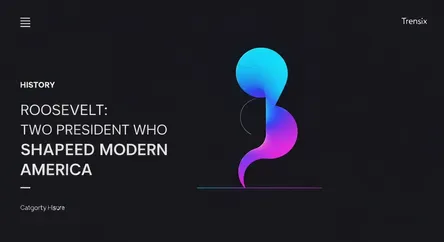History
Roosevelt: Two Presidents Who Shaped Modern America

An overview of two of America's most influential presidents, Theodore and Franklin D. Roosevelt, and their lasting impact on the nation.
What is it?
The name Roosevelt refers to two of the most impactful presidents in United States history: Theodore Roosevelt (26th) and Franklin Delano Roosevelt (32nd), often called FDR. Theodore, a Republican, was known for his "Square Deal" policies, trust-busting, and pioneering conservation efforts, establishing numerous national parks and forests. FDR, a Democrat, led the nation through the Great Depression and World War II. He is famous for his New Deal programs, a series of reforms, and public works projects that reshaped the role of the federal government in the economy and in citizens' lives.
Why is it trending?
The legacies of both Roosevelts remain highly relevant in political and social discourse. Theodore Roosevelt's assertive foreign policy and his efforts to regulate big business are often referenced in modern debates. His push for conservation is a cornerstone of the modern environmental movement. Franklin D. Roosevelt's New Deal is a constant touchstone in discussions about government intervention in the economy, social safety nets like Social Security, and the extent of presidential power. FDR's leadership during WWII also makes him a perennial figure of study and comparison.
How does it affect people?
The actions of both Roosevelts have a profound and lasting impact. Many Americans today visit national parks and forests established by Theodore Roosevelt, benefiting from his conservationist foresight. His stance on corporate regulation set a precedent for consumer protection. FDR's New Deal programs fundamentally changed American society. Millions rely on Social Security for retirement income, and federal programs like the Federal Deposit Insurance Corporation (FDIC) still protect bank deposits. The infrastructure built during the New Deal, from roads to public buildings, is still in use, and the debate over the size and role of government he ignited continues to shape modern politics.